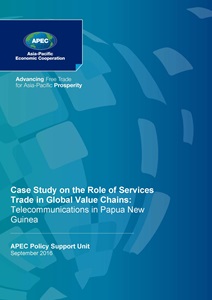Case Study on the Role of Services Trade in Global Value Chains: Telecommunications in Papua New Guinea

| Published Date | October 2016 |
|---|---|
| Type of Publication | Reports |
| Publication Under | APEC Secretariat, APEC Policy Support Unit |
| Accessed | 15637 |
| Pages | 38 |
| Download publication | Download |
Description
This case study is one out of the four which examines the role of services in global value chains (GVCs), particularly the effects market-opening services development have had on the economy and GVCs.
This case study examines the effects of the deregulation of Papua New Guinea’s (PNG) mobile telecommunications sector, a process which began in 2007. It is estimated that the effects of liberalisation in this sector include a boost to GDP of up to 2.3% and total cost savings of 2% to 5% for businesses. Mobile telecommunications have also helped deliver improvements in safety and financial transparency. However, PNG’s ability to participate in and benefit from GVCs is constrained by high costs and a difficult business environment. While communications costs reductions and services improvements that have been enabled by deregulation have helped address some of these issues, much remains to be done to address the broader costs of doing business.
This case study examines the effects of the deregulation of Papua New Guinea’s (PNG) mobile telecommunications sector, a process which began in 2007. It is estimated that the effects of liberalisation in this sector include a boost to GDP of up to 2.3% and total cost savings of 2% to 5% for businesses. Mobile telecommunications have also helped deliver improvements in safety and financial transparency. However, PNG’s ability to participate in and benefit from GVCs is constrained by high costs and a difficult business environment. While communications costs reductions and services improvements that have been enabled by deregulation have helped address some of these issues, much remains to be done to address the broader costs of doing business.

